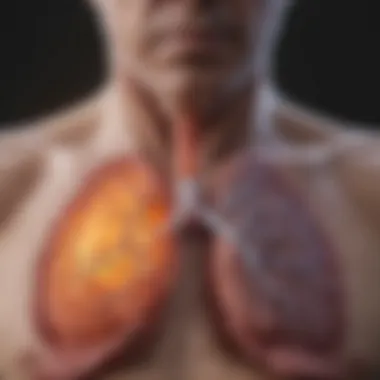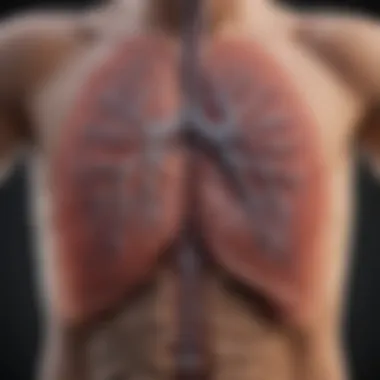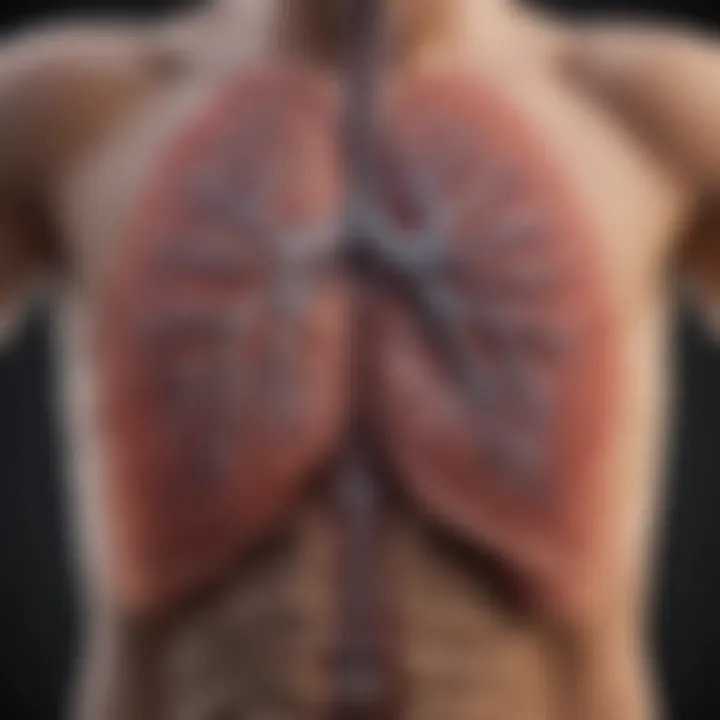Impact of Smoking Cessation on COPD Progression


Intro
Chronic Obstructive Pulmonary Disease (COPD) is a severe lung condition that primarily impacts airflow. It is often linked to long-term smoking. The consequences of COPD are profound, affecting the quality of life and longevity of individuals. Understanding the repercussions of smoking cessation plays a critical role in managing this condition.
Quitting smoking can have a significant influence on COPD progression. This article presents a comprehensive analysis, shedding light on the physiological changes after smoking cessation and their implications for patient outcomes. By analyzing the existing body of scientific literature, the discussion aims to clarify whether ceasing smoking can slow or even halt the progression of COPD.
The exploration of this topic is vital. Many individuals diagnosed with COPD have a history of smoking. A thorough understanding of the changes triggered by quitting can empower patients with knowledge and encourage positive health behaviors.
Research Overview
Summary of Key Findings
The scientific community has conducted numerous studies focusing on the effects of smoking cessation on COPD. Key findings indicate a range of outcomes following quitting:
- Lung Function Improvement: Studies show that even after the onset of COPD, lung function can stabilize or even show improvement.
- Reduction in Symptoms: Patients often report fewer respiratory symptoms, such as coughing and breathlessness, after quitting.
- Slower Disease Progression: Long-term data suggests that the rate of decline in lung function can slow significantly after individuals stop smoking.
"Quitting smoking is the most critical step individuals with COPD can take to improve their health outcomes."
Relevance to Current Scientific Discussions
These findings contribute meaningfully to ongoing scientific discussions. Understanding the positive implications of smoking cessation on COPD highlights the need for public health initiatives focusing on smoking cessation programs. This topic intersects with various areas, including disease management, healthcare policies, and preventive medicine. The ongoing debate about the effectiveness of different cessation methods underscores the importance of tailored approaches, catering to individual needs and circumstances.
Methodology
Research Design and Approach
The studies analyzed in this article employ a diverse range of research designs, including cohort studies, clinical trials, and meta-analyses. Each provides unique insights into the effects of smoking cessation on COPD.
Data Collection and Analysis Techniques
Data collection generally involves respiratory function tests, patient-reported outcome measures, and longitudinal follow-up to assess changes over time. Statistical techniques such as regression analysis are often used to determine the strength of associations between smoking cessation and lung function changes.
Through synthesizing these findings, the article endeavors to clarify the nuances of COPD progression after smoking cessation, offering a clearer understanding for students, researchers, educators, and professionals in healthcare.
Prologue to COPD
Chronic Obstructive Pulmonary Disease, commonly known as COPD, presents a serious public health challenge. It primarily affects airflow in the lungs and is highly associated with smoking. Understanding COPD is fundamental for any exploration of its progression post-smoking cessation. This knowledge provides insights into how quitting smoking can affect lung function and overall health.
Defining Chronic Obstructive Pulmonary Disease
COPD is an umbrella term that encompasses several respiratory conditions, including emphysema and chronic bronchitis. The defining characteristic of COPD is the persistent airflow limitation that is often progressive and associated with an enhanced chronic inflammatory response in the airways and lungs. Patients experience symptoms that can seriously impact their quality of life, including dyspnea, chronic cough, and sputum production.
The disease often remains underdiagnosed, especially in its early stages, due to nonspecific symptoms. Accurate diagnosis typically requires a combination of clinical assessment and pulmonary function tests. It is crucial to distinguish COPD from other pulmonary disorders because its management and treatment differ significantly.
Epidemiology and Risk Factors
Understanding the epidemiology of COPD helps clarify the scope of the disease. According to the World Health Organization, millions worldwide suffer from COPD, making it one of the leading causes of morbidity and mortality. The prevalence of the disease correlates strongly with smoking, but there are several other risk factors to consider.
Key risk factors include:
- Tobacco smoke exposure: A primary cause, with both active smokers and those exposed to secondhand smoke at risk.
- Environmental pollutants: Factors like indoor air pollution from biomass fuel and outdoor air pollution can significantly contribute to disease progression.
- Occupational hazards: Long-term exposure to harmful dust and chemicals at work raises the risk of developing COPD.
- Genetic predisposition: Conditions like alpha-1 antitrypsin deficiency can increase susceptibility to lung damage, leading to COPD.
To effectively address COPD progression after smoking cessation, recognizing these risk factors is essential. They influence not only the onset of the disease but also how patients might experience recovery and changes in lung function after quitting smoking. Understanding the disease's definition and its risk factors provides a solid foundation for further discussions on progression and management.
Understanding Smoking and Its Impact on Lung Health
Smoking is a primary source of lung damage, leading to various pulmonary diseases, including Chronic Obstructive Pulmonary Disease (COPD). Recognizing the relationship between smoking and lung health is crucial. This connection not only elucidates the mechanisms behind disease development but also informs treatment strategies following smoking cessation. Patients who quit smoking often wonder about their prognosis and the changes that will take place in their lung health. Understanding these factors can significantly affect patient behavior and motivation.
There are several key elements to consider when analyzing the impact of smoking on lung health:


- Chronic Inflammation: Smoking introduces harmful chemicals into the lungs, triggering continuous inflammation. This long-term inflammation can lead to structural changes in lung tissue, contributing to the development of COPD.
- Mucus Production: Cigarette smoke increases mucus production, impairing airflow. Over time, excess mucus contributes to airway obstruction, making breathing more difficult.
- Alveolar Damage: Smoking causes damage to the alveoli, the tiny air sacs in the lungs. This damage reduces the surface area available for gas exchange, leading to decreased oxygen levels in the blood.
- Increased Infection Risk: Smokers experience a higher risk of respiratory infections, which can exacerbate lung conditions and accelerate the progression of COPD.
Moreover, it's essential to acknowledge the psychological aspects related to smoking and lung health. Many individuals may be aware of the risks but still find it challenging to quit. Understanding these factors can lead to tailored interventions, encouraging a supportive environment for those aiming to improve their lung health post-smoking.
Mechanisms of Lung Damage from Smoking
The mechanisms of lung damage due to smoking can be understood on a cellular level. The introduction of toxins from cigarette smoke results in oxidative stress, leading to the destruction of lung cells. Inflammatory cells infiltrate lung tissue, releasing enzymes that further degrade the airway structure. This complex interaction of inflammatory responses and toxic exposure ultimately results in compromised lung function over years of smoking.
The Relationship Between Smoking Duration and COPD Severity
Studies demonstrate a strong correlation between smoking duration and the severity of COPD. Longer smoking histories often lead to more pronounced symptoms and more significant lung function decline. These findings emphasize the importance of duration as a risk factor; as such, even individuals who quit smoking may face an uphill battle based on their previous exposure. On the other hand, quitting smoking at any stage can yield health benefits, and it is never too late to improve lung health.
Research shows that individuals who quit smoking for even a short duration experience measurable improvements in lung function.
As we delve deeper into this article, these components will be vital in understanding how COPD progresses following smoking cessation and what factors influence recovery.
The Importance of Smoking Cessation
Smoking cessation is a pivotal aspect of managing Chronic Obstructive Pulmonary Disease (COPD). When individuals quit smoking, they initiate a series of physiological processes that can significantly affect the progression of the disease. This section delves into the substantial benefits of quitting smoking and addresses key considerations that highlight why this element is crucial for patients diagnosed with COPD.
Cessation of smoking results in both immediate and long-term advantages that can enhance overall lung function. The body begins to repair itself quite soon after quitting, leading to improvements in various health parameters. In particular, even after prolonged periods of smoking, the respiratory system can show signs of recovery. This emphasizes the importance of encouraging patients and potential smokers to recognize the potential for improvement through cessation.
Moreover, smoking is a primary risk factor for COPD deterioration. Mental health also plays a role, as encouragement and support can lead smokers to quit effectively. With a structured plan in place, individuals can find motivation and means to successfully overcome their nicotine dependency.
"Quitting smoking is the most effective way to halt the progression of COPD and improve overall health outcomes."
Immediate Benefits of Quitting Smoking
The immediate benefits of quitting smoking can be quite surprising. Within just 20 minutes of smoking cessation, heart rate returns to normal levels. Within 24 hours, the risk of heart attack begins to decrease. Additionally, within two weeks to three months, lung function starts to improve. Patients often report experiencing reduced coughing and shortness of breath. The ability to breathe more easily encourages increased physical activity, which in turn contributes to better lung health.
- Reduced Mucus Production: Quitting smoking lowers the production of mucus in the lungs, which reduces the likelihood of infection.
- Sense of Taste and Smell: Many smokers notice a marked improvement in their sense of taste and smell after quitting, enhancing their quality of life.
- Cardiovascular Recovery: The cardiovascular system experiences immediate benefits, reducing risks associated with heart disease.
These benefits not only contribute to a higher quality of life but also provide motivation for individuals to remain smoke-free.
Long-term Health Gains and Prognosis
The long-term effects of smoking cessation on health outcomes in COPD patients cannot be understated. Long-term abstaining from smoking leads to a significant reduction in mortality rates. Studies have shown that after quitting, lung function can stabilize, greatly influencing prognosis. This stabilization is critical for patients, as it translates to an improved ability to perform daily activities.
Additionally, reduced risk of exacerbation is a significant health gain. Patients who have quit smoking tend to experience fewer flare-ups of COPD symptoms, which can be debilitating. With fewer exacerbations, there is a decreased need for emergency medical interventions or hospitalizations.
Factors to consider include:
- Duration of Smoking Prior to Cessation: The length of smoking history can play a role in the extent of recovery.
- Age at Cessation: Younger patients generally have better outcomes compared to those who quit later in life.
- Environmental Influences: Ongoing exposure to pollutants post-cessation can impair the recovery process.
The prognosis for COPD patients improves dramatically upon quitting smoking, highlighting the importance of cessation in any management strategy.
The Pathophysiology of COPD Progression
Understanding the pathophysiology of Chronic Obstructive Pulmonary Disease (COPD) progression is essential in comprehending how the disease evolves after an individual ceases smoking. The intricate mechanisms that lead to lung damage are multifaceted, and recognizing these factors can empower healthcare professionals, patients, and researchers alike. Identifying the biological processes involved not only sheds light on the disease itself but also helps in tailoring approaches for better management strategies post-smoking cessation.
Understanding Disease Progression
COPD is characterized by persistent airflow limitation primarily due to inflammation and structural changes in the lungs. The progression of this disease is often gradual and can be influenced by various factors like age, genetics, and environmental exposures. The inflammatory response becomes chronic due to initial damage caused by toxic substances, particularly from cigarette smoke.
The damage includes destruction of alveolar walls and loss of elastic recoil in the lungs, leading to air trapping and reduced gas exchange efficiency. Studies suggest that the degree of lung function decline can vary significantly among individuals. However, studies also indicate that quitting smoking can slow down this decline in lung function. This insight is crucial as it provides a potential avenue for improved patient outcomes.
Key Processes in Disease Progression:
- Inflammatory Response: Prolonged exposure to irritants causes a sustained inflammatory response, promoting further lung damage.
- Mucus Hypersecretion: The chronic inflammation leads to excessive mucus production, contributing to airway obstruction.
- Airway Remodeling: Structural changes in the airway walls occur, leading to fixed obstruction in airflow.


Factors Influencing COPD Progression Post-Smoking
The trajectory of COPD after smoking cessation often varies based on certain factors. Understanding these can aid in predicting patient outcomes and improving therapeutic strategies.
Influencing Factors:
- Duration of Smoking: Longer smoking histories often correlate with more severe forms of COPD and slower recovery post-cessation.
- Age: Older individuals may experience a slower recovery of lung function after quitting, as natural aging processes can exacerbate lung health issues.
- Other Life Choices: A person's diet, level of physical activity, and adherence to treatment protocols impact overall lung health and COPD progression.
- Comorbidities: The presence of other chronic conditions, such as cardiovascular diseases, can further complicate the management of COPD.
Evidence on COPD Progression After Smoking Cessation
The study of Chronic Obstructive Pulmonary Disease (COPD) progression post-smoking cessation is vital in understanding the potential for recovery and improvement in lung function. The evidence gathered through research and clinical observations sheds light on various aspects of the disease and how quitting smoking can influence its progression. Understanding this topic can help patients, healthcare providers, and policymakers tailor effective interventions to maximize health outcomes.
Patients who quit smoking often experience a range of physiological changes, some of which can lead to a stabilization or even improvement in their respiratory condition. These benefits underscore the importance of timely and effective smoking cessation efforts. By focusing on evidence from current studies, the article paints a clearer picture of what patients can expect after giving up smoking.
Current Research Findings
Research has shown that the benefits of quitting smoking extend beyond immediate respiratory improvement. Various studies indicate significant reductions in the rate of COPD progression after smoking cessation. According to a notable 2017 study published in the New England Journal of Medicine, the annual decline in lung function decreases significantly in individuals who quit versus those who continue to smoke. This finding is encouraging for patients contemplating smoking cessation.
Additional studies have explored the timeline of health benefits post-cessation. Within weeks of quitting, patients can experience reduced respiratory symptoms and improved lung function. Longitudinal studies suggest that while some damage may be irreversible, quitting smoking halts further deterioration and allows some level of recovery in lung function.
Case Studies and Clinical Observations
Individual case studies reveal contrasting experiences, emphasizing the variable course of COPD in former smokers. In one notable case, a 60-year-old woman with a long history of smoking reported a marked improvement in her COPD symptoms after one year of quitting. At follow-up, her lung function tests showed a notable increase in forced expiratory volume, illustrating the profound impact of smoking cessation.
Conversely, some patients may not exhibit significant improvements, highlighting that individual factors such as age, overall health, and the extent of lung damage prior to quitting influence outcomes. Clinical observations allow healthcare professionals to better understand these nuances. Continuous monitoring and personalized treatment plans enhance patient care and prognosis in the context of COPD.
"Quitting smoking can notably slow the progress of COPD, resulting in improved patient outcomes and quality of life."
Effective management strategies, based on evidence from ongoing research, create a framework for supporting patients through smoking cessation. As the understanding of COPD progression deepens, so too does the ability to implement more targeted therapies and rehabilitation strategies to enhance the lives of those impacted by this chronic disease.
Management Strategy for COPD After Quitting
Management of Chronic Obstructive Pulmonary Disease (COPD) after a person has quit smoking is essential for enhancing long-term health outcomes and improving quality of life. While stopping smoking is a significant first step, implementing an effective management strategy can further mitigate the damaging effects of COPD. This section will delve into the specific treatment options available to COPD patients and explore rehabilitation and support programs designed to aid recovery and maintain lung health.
Treatment Options for COPD Patients
COPD presents various challenges, necessitating a multifaceted treatment approach tailored to individual needs. Treatment options generally include medications, oxygen therapy, and surgery in certain cases.
- Medications: The first line of treatment consists of bronchodilators, which relax the muscles surrounding the airways making breathing easier. Inhaled corticosteroids can also be prescribed to reduce inflammation and prevent exacerbations. Newer medications such as phosphodiesterase-4 inhibitors may offer additional benefits for patients with severe symptoms.
- Oxygen Therapy: For those with low oxygen levels in the blood, supplemental oxygen can be critical. This therapy helps patients breathe better and sustain physical activity, thus improving their overall well-being.
- Surgical Options: In severe cases, surgical interventions like lung volume reduction surgery or lung transplant may be considered. Although these are more invasive options, they can provide significant improvements in lung function for carefully selected patients.
Rehabilitation and Support Programs
In conjunction with medical treatment, rehabilitation and support programs play a pivotal role in comprehensive COPD management. These programs focus on enhancing physical capacity and providing education about COPD.
- Pulmonary Rehabilitation: This structured program combines exercise training, education, and behavioral support. Patients learn about the disease and how to manage symptoms. The tailored exercise component is crucial as it improves strength and endurance, allowing individuals to enjoy a more active lifestyle.
- Nutritional Support: Following smoking cessation, nutrition becomes especially important. Many patients experience weight changes or muscle loss. Dietary adjustments can enhance overall health and support energy levels.
- Psychosocial Support: Quitting smoking is a major life change that can impact mental health. Support groups or counseling can provide crucial emotional support and motivation to stay smoke-free.
It is important to recognize that ongoing management for COPD doesn’t end with quitting smoking. Adopting a comprehensive approach that includes treatment optimization, rehabilitation, and support can significantly influence the trajectory of COPD and improve patient outcomes.
"Continuous management is not just about treating symptoms; it’s about empowering patients to take control of their health."
For further information on COPD management, resources from credible health agencies can be consulted on Wikipedia and Britannica.
By investing in proper management strategies, patients can experience a marked improvement in their quality of life post-smoking cessation.
Lifestyle Considerations Post-Smoking
The transition from a smoking lifestyle to a tobacco-free existence is significant not only for immediate health improvements but also for long-term management of Chronic Obstructive Pulmonary Disease (COPD). Lifestyle changes post-smoking can shape the trajectory of COPD progression and influence overall well-being.
Adopting healthier behaviors can enhance lung function and mitigate the decline associated with COPD. It is vital for former smokers to understand that their choices in diet, exercise, and daily activities play a crucial role in managing their condition.


The focus on lifestyle considerations is twofold: it addresses the need for practical changes and emphasizes the importance of psychological resilience as patients navigate their new life without cigarettes.
Dietary Adjustments for Lung Health
Diet can have a profound effect on lung health and the management of COPD. A well-balanced diet rich in antioxidants, vitamins, and minerals can help to reduce inflammation and support lung function. Nutrients such as vitamin C, vitamin E, and omega-3 fatty acids are particularly beneficial.
Former smokers should prioritize foods that promote lung resilience. This includes:
- Fruits and Vegetables: Rich in antioxidants.
- Whole Grains: Source of fiber and nutrients.
- Lean Proteins: Building blocks for body repair.
- Healthy Fats: Found in fish, nuts, and olive oil.
Additionally, hydration is often overlooked, but it's crucial for maintaining thin mucus in the lungs. Staying well-hydrated can help in expectoration and overall lung function. However, individuals should avoid processed foods high in salt and sugar, as these can contribute to inflammation and exacerbated symptoms.
Exercise and Physical Therapy Strategies
Physical activity is paramount for individuals recovering from smoking and dealing with COPD. Regular exercise helps in maintaining muscle strength and improving lung capacity. Engaging in physical therapy can provide tailored regimens that focus on breathing exercises, endurance training, and flexibility.
Some effective strategies include:
- Aerobic Training: Light walking, swimming, or cycling to enhance cardiovascular health.
- Strength Training: Using weights or resistance bands to preserve muscle mass.
- Breathing Exercises: Techniques such as pursed-lip breathing can help improve oxygen exchange.
Structured rehabilitation programs guided by healthcare professionals may yield the best results, offering support and motivation. Overall, the integration of appropriate exercise routines can lead to improved quality of life for individuals suffering from COPD.
Future Directions in COPD Research
Research on Chronic Obstructive Pulmonary Disease (COPD) is continually evolving, especially in the wake of smoking cessation. Understanding how the disease progresses after one quits smoking holds immense potential for improving patient outcomes. This section explores specific emerging directions in research that may alter the landscape of COPD management and treatment.
Emerging Therapies and Innovations
Recent advances in biomedical science suggest a promising frontier in COPD care. One area of focus is the development of novel pharmacological therapies. New medications target specific inflammatory pathways and lung repair mechanisms. Studies suggest that biologics could offer hope for patients who do not respond well to traditional treatments. Additionally, stem cell therapy is being investigated for its potential to regenerate damaged lung tissue.
Other innovations include gene therapy, aimed at correcting the underlying mechanisms of lung damage. While still in early stages, these approaches have shown potential in clinical trials, providing a glimpse into a future where COPD could be managed more effectively.
Moreover, digital health technologies are becoming invaluable. Wearable devices and smartphone applications monitor respiratory health, provide real-time data, and engage patients in their own care. Remote monitoring may aid in early intervention, leading to better management of COPD after quitting smoking.
Interdisciplinary Approaches to COPD Management
An interdisciplinary method to managing COPD post-smoking cessation is critically important. Different specialists can address various aspects of the disease, thus enhancing patient care. Pulmonologists focus on the respiratory system, while cardiologists assess heart implications related to COPD.
Moreover, incorporating nutritionists can help tailor dietary plans that support lung health. Research indicates that certain vitamins and minerals may influence lung function and overall health. Involving physiotherapists ensures that patients engage in personalized exercise regimens, crucial for maintaining lung capacity and function.
Healthcare providers could utilize collaborative care models, integrating behavioral therapists for combined strategies addressing mental health challenges linked with quitting smoking.
*"A multi-faceted approach involving various health disciplines will help enhance comprehensive care for COPD patients.\
Epilogue and Implications for Patients
Chronic Obstructive Pulmonary Disease (COPD) significantly impacts the lives of individuals who have smoked. The conclusion drawn from our investigation reflects the critical theme that even after cessation, the trajectory of COPD does not necessarily stabilize. Understanding this progression is crucial for both patients and healthcare providers.
The implications following smoking cessation are profound. Patients must be aware that while quitting smoking yields immediate benefits, the long-term management of COPD remains essential. It is evident that smoking cessation is a powerful step toward improving lung health, yet it does not eliminate the risks associated with previous exposure to tobacco. Thus, ongoing monitoring and care are imperative to mitigate further decline in lung function.
Moreover, there exist multiple factors that can aid in managing the symptoms of COPD. These include adherence to medical therapies, participation in pulmonary rehabilitation, and adopting lifestyle changes aimed at enhancing overall well-being. Evaluating the progression of COPD following smoking cessation provides a framework for developing personalized management strategies, ensuring a tailored approach to patient care.
"Smoking cessation transforms the life of COPD patients, but understanding post-cessation progression is essential for effective management."
Summary of Key Findings
- Reduction in Symptoms: Many individuals experience a decrease in respiratory symptoms and an increase in quality of life soon after quitting.
- Lung Function Stability: For some, lung function may stabilize, but not all will experience a complete halt in the decline.
- Risk Factors: Previous smoking history remains a significant factor affecting the long-term outlook, along with environmental exposures and genetic predispositions.
- Intervention Necessity: Regular medical evaluations and tailored interventions can prevent exacerbations and reduce morbidity.
Recommendations for Patients Post-Cessation
Following smoking cessation, specific recommendations can assist patients in managing their COPD effectively. These recommendations include:
- Regular Medical Check-ups: Staying in contact with healthcare providers ensures any changes in respiratory health are promptly addressed.
- Medication Adherence: It’s important to use prescribed inhalers or other medications consistently to manage symptoms effectively.
- Engaging in Rehabilitation: Participating in pulmonary rehabilitation programs enhances lung capacity and overall physical functioning.
- Maintaining a Healthy Lifestyle: A balanced diet and regular physical activity tailored to ability can significantly improve health outcomes.
- Support Networks: Connecting with non-profit organizations or support groups can provide emotional support and practical advice for managing COPD.
These steps not only help in managing the condition but also foster a sense of control and empowerment for individuals navigating the complexities of life post-smoking.



